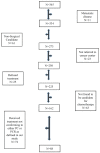Comparison of Perioperative Chemotherapy versus Postoperative Chemoradiotherapy for Operable Stomach Cancer: A Western Canadian Province Experience
- PMID: 33802661
- PMCID: PMC8025817
- DOI: 10.3390/curroncol28020120
Comparison of Perioperative Chemotherapy versus Postoperative Chemoradiotherapy for Operable Stomach Cancer: A Western Canadian Province Experience
Abstract
Background: The standard approaches for resectable stomach cancer are postoperative chemoradiotherapy (PCR) or perioperative chemotherapy (PC). Limited evidence is available regarding the superiority of one of the two approaches. We aimed to compare the survival of patients with operable stomach cancer who were treated with PC or PCR.
Methods: In this retrospective cohort study, patients with operable stomach cancer diagnosed between 2005-2015 in the province of Saskatchewan were identified and, based on type of treatment, were placed into PCR and PC groups. A Cox proportional multivariate analysis was performed to assess independent prognostic variables, including survival advantage of PC over PCR.
Results: A total of 88 eligible patients with a median age of 66 (56-71) and a male to female ratio of 1:0.44 were identified. Seventy-three (83%) patients had pathologically node positive disease. Sixty-seven (76%) patients received PCR, while 21 (24%) patients received PC. The median overall survival of the whole group was 34 months, with 38 months (95% CI 24.6-51.3) in the PCR group vs. 30 months (14.3-45.7) in the PC group (p = 0.29). Median relapse-free survival was 34 months (20.7-47.3) in the PCR group vs. 23 months (6.7-39.3) in the PC group (p = 0.20). Toxicities were comparable. On multivariate analysis, T ≥ 3 tumor (HR, 3.57 (1.39-8.56)), neutrophil to lymphocyte ratio (LNR) > 2.8 (HR, 1.85 (1.05-3.25)), and positive resection margins (HR, 1.89 (1.06-3.37)) were independently correlated with inferior survival.
Conclusions: This well-designed population based cohort study suggests a lack of survival benefit of PC over PCR. Both treatment options remain viable approaches for resectable stomach cancer.
Keywords: neutrophil to lymphocyte ratio; perioperative chemotherapy; postoperative chemoradiotherapy; stomach cancer.
Conflict of interest statement
No author has any conflict of interest to report.
Figures



References
-
- Ferlay J., Shin H., Bray F., Forman D., Mathers C., Parkin D. GLOBOCAN 2008 v2.0, Cancer Incidence and Mortality Worldwide: IARC Cancer Base No. 10. International Agency Research Cancer; Lyon, France: 2010.
-
- Macdonald J.S., Smalley S.R., Benedetti J., Hundahl S.A., Estes N.C., Stemmermann G.N., Haller D.G., Ajani A.J., Gunderson L.L., Jessup J.M., et al. Chemoradiotherapy after surgery compared with surgery alone for adenocarcinoma of the stomach or gastroesophageal junction. N. Engl. J. Med. 2001;345:725–730. doi: 10.1056/NEJMoa010187. - DOI - PubMed
-
- Cunningham D., Allum W.H., Stenning S.P., Thompson J.N., Van de Velde C.J.H., Nicolson M., Scarffe J.H., Lofts F.J., Falk S.J., Iveson T.J., et al. Perioperative chemotherapy versus surgery alone for resectable gastroesophageal cancer. N. Engl. J. Med. 2006;355:11–20. doi: 10.1056/NEJMoa055531. - DOI - PubMed
Publication types
MeSH terms
LinkOut - more resources
Full Text Sources
Other Literature Sources
Medical

